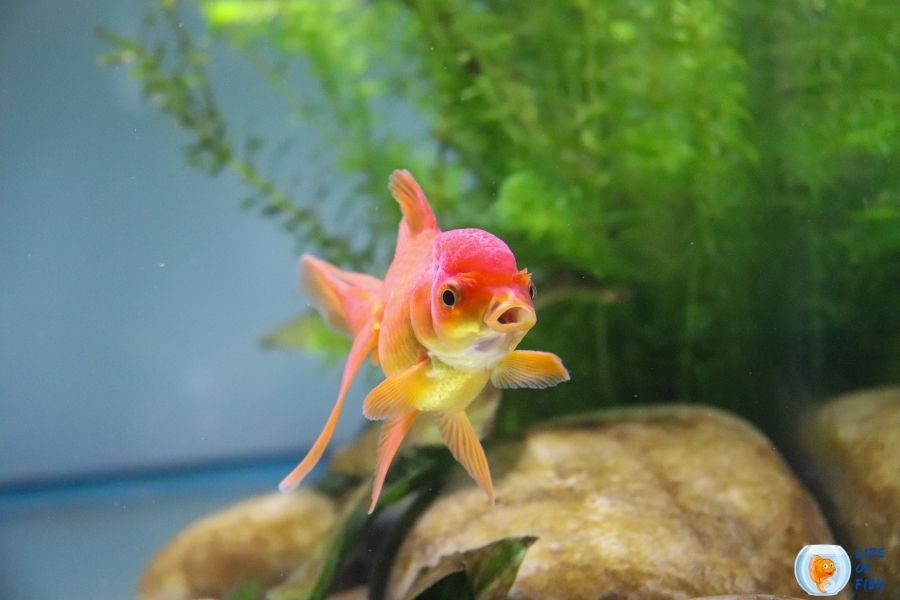We all know that fish always swim forward. Although some fish can swim backward, it is unusual for most fish to swim backward. So, if you ask, “Why is my fish swimming fast back and forth?” we won’t be surprised.
Swimming back and forth is not normal behavior for aquarium fish. So, let’s find out the answer to your question.

Why is my fish swimming fast back and forth?
Jump To
Fish swim fast back and forth because of stress. Unless you have a fish that can swim backward (like triggerfish), swimming backward is not natural.
When fish are in the wild, they use this swimming pattern as a way to escape predators. In your aquarium, your fish is most likely trying to escape something that is stressing it out.
When your fish is stressed, oftentimes, your fish will show other signs and symptoms of stress as well.
By observing your fish carefully, you will be able to tell if stress is the reason why your fish is swimming fast back and forth.
Here are some other signs and symptoms of stress in fish:
Your fish is hiding a lot
When your fish is stressed, it will become nervous and try to hide. If you notice your fish is hiding more than usual, it is a sign that something is stressing it out.
Your fish has lost its appetite
If your fish has lost its appetite, it is another sign of stress. When fish are stressed, they often stop eating because they don’t have the energy to eat.
Your fish is panting
Panting is when fish open and close their mouths rapidly. This is a way for fish to get more oxygen because they are stressed and need more oxygen to breathe.
Your fish is swimming erratically
If your fish is swimming erratically, it is a sign of stress. Fish that are stressed often swim in a fast and erratic way because they are trying to escape their stressors.
Your fish is rubbing against objects in the tank
When fish are stressed, they often try to rub against objects in the tank. This is a way for them to relieve their stress.
Further, since stress causes many diseases in fish, rubbing against objects can help remove the parasite and bacteria from their bodies.
Your fish has clamped fins
Clamped fins are when your fish’s fins are held close to its body. This is another way to tell if your fish is stressed. When fish are stressed, they often clamp their fins to save energy.
Your fish is gasping for air
If your fish is gasping for air, it is a sign that it is not getting enough oxygen. This can be caused by stress or other factors such as poor water quality.
Your fish has white spots on its body
White spots on your fish’s body are often a sign of disease. However, in some cases, these white spots can be caused by stress.
Your fish’s color is fading
If your fish’s color is fading, it is a sign of stress. When fish are stressed, they often lose their color because they are not getting enough oxygen or they are sick.
There are many other signs and symptoms of stress in fish. However, these are some of the most common ones.
If you notice any of these signs in your fish, it is a good idea to take action to reduce the stress in your fish’s life.

Causes of stress in fish that result in erratic behavior (+ solutions)
While many different factors cause stress, only some of them result in erratic behavior, like fish swimming fast back and forth. Below are some of the most common reasons of stress that result in this type of behavior:
Inadequate water quality
One of the most common reasons for stress in fish is poor water quality. If the water in your tank is not clean, it can cause a variety of problems for your fish.
Poor water quality can result in your fish not getting enough oxygen, which can lead to stress and erratic behavior.
Further, neglected water conditions result in Ammonia spikes because of leftover food and fish debris.
Ammonia spikes will cause Ammonia poisoning, which is a common cause of death in fish. Ammonia poisoning will result in your fish gasping for air, leading to stress and erratic behavior.
Solution: If your fish is already acting weird, you must test the water parameters immediately.
You can use a cheap water testing kit sold at your local aquarium shop. Otherwise, bring a water sample to your local pet shop and ask them to test it for you.
After testing the water, you should take steps to improve the water quality if it is poor. If you get improper water parameters, use chemicals like water conditioners to fix them.
You can also do a water change to improve the water quality. Water changing is vital when you observe higher levels of harmful nutrients like Ammonia, Nitrate, and Nitrite. However, massive water changes are also stressful to your fish.
Therefore, about 5% of water changing every hour is recommended to reduce stress in your fish.
Irregular water temperature
Another common cause of stress in fish is irregular water temperature. Fish are very sensitive to changes in temperature, and even a small change can result in stress.
If the water temperature in your tank is too high or too low, it can cause your fish to become stressed, which can lead to erratic behavior.
Sudden temperature fluctuations also result in stress. For example, if the water temperature in your tank drops suddenly, it can cause your fish to become stressed and swim erratically. This often happens in winter when the temperature in the room drops suddenly.
Solution: The best way to solve this situation is to use an aquarium heater and thermometer.
By using these two devices, you can keep the water temperature in your tank stable, which will reduce stress on your fish.
If your fish tank becomes hot because of the sun, you can replace some of the water with colder water as a temporary fix.
You should keep your fish tank in a shady area if you live in a temperate climate to prevent this from happening.
Improper diet
Another common cause of stress in fish is an improper diet. If your fish are not getting the right nutrients, it can lead to stress and erratic behavior.
Some fish have a good appetite while others don’t. So, these fish will eat whatever you feed at anytime.
But eating anything doesn’t mean that you can feed them anything. Fish also need a balanced diet, just like humans.
If you don’t provide a well-balanced diet, your fish will become malnourished and stressed. This can lead to various complications, such as swim bladder disease and erratic behavior.
Solution: The best way to solve this is to feed your fish a high-quality diet. There are various types of fish food available on the market, so you should choose one that is suitable for your fish.
If you observe swim bladder disease in your fish, you can try treating it with boiled peas or daphnia. These foods can help improve the condition of your fish.
You should also avoid overfeeding your fish. Overfeeding pollutes the water and can also cause stress in your fish.
Low oxygen levels
Although fish don’t breathe air like humans, they still need oxygen to survive. They breathe through their gills and need a certain amount of oxygen in the water to stay alive.
If the water in your tank doesn’t have enough oxygen, it can lead to stress and erratic behavior in your fish.
There are several reasons why the oxygen levels in your tank become low. One common reason is overstocking. If you have too many pet fish in your tank, it can lead to low oxygen levels.
Another common reason is a lack of aeration. If the water in your tank is not properly aerated, it can also lead to low oxygen levels.
Further, temperature also plays a role in the dissolved oxygen levels in the water. As water temperature increases, the dissolved oxygen levels decrease. So, if the water in your tank is too warm, it can also lead to low oxygen levels.
Solution: The best way to resolve this problem is to add an aerator to your tank. An aerator will help to circulate the water and add oxygen to it.
You can also try adding plants to your tank. Plants produce oxygen and can help increase the oxygen levels in your tank.
If you have too many fish in your tank, you should consider rehoming some of them. By reducing the number of fish in your tank, you can increase the oxygen levels and reduce stress in your fish.

Fish tank size
Another common cause of stress in fish is a small fish tank. If the fish tank is too small, your fish will not have enough space to swim and explore.
Different fish species need different amounts of space. So, you should research the minimum tank size for the fish species that you have.
Solution: The best way to resolve this problematic situation is to upgrade to a larger fish tank. By doing so, you will give your fish the space they need to swim and explore.
You can also try adding additional hiding places to your fish tank. By providing your fish with places to hide, you can reduce their stress levels.
Transporting fish
When you transport your fish to another place, it can cause a lot of stress. This is because fish are very sensitive to changes in their environment. Transporting can also cause damages and injuries that can be fatal sometimes.
This often happens when you buy new fish and bring them home. The stress of the journey can cause your fish to become sick or die.
Solution: A fish transfer bag is the best solution to this problem. A fish transfer bag will help to reduce the stress of your fish during transport.
Once you reach the destination, do not add your new fish to your new tank right away. Instead, keep them in the transport bag and float them in your new tank for about an hour. This will help your fish to acclimate to the new water conditions.
After an hour, you can slowly add your fish to the new tank. You should also avoid overfeeding your fish during transport as it can pollute the water and stress your fish.
You should also try to avoid transporting your fish too often. If you must transport them, make sure to do it as little as possible.
Massive changes in water conditions
As we mentioned before, massive water changes can stress out your fish. This is because the water conditions that your fish are accustomed to change abruptly, and they are unable to adjust.
Water parameters can also change when adding chemicals, medications, and other substances to your tank. If these changes are too drastic, they can lead to stress in your fish.
Solution: The best way to solve this problem is to ensure that you do not make drastic changes in your tank. If you need to make changes, do it gradually.
For example, if you need to add chemicals or medications to your tank, do it slowly over a period of time. This will let your fish acclimate to the new water conditions.
You should also avoid adding too many new fish to your tank at once. You can reduce stress in your fish by doing so.
Conclusion
Fish swimming fast back and forth is a sign of stress. Various factors can cause stress in fish, such as a small fish tank, high water temperature, low oxygen levels, changes in water conditions, and transporting them to another place.
The best way to reduce stress in fish is to make sure that their environment is stable and familiar. You can avoid drastic changes in their tank, providing them with ideal water conditions, places to hide, and not overfeeding them.
If you suspect that your fish are stressed, you should observe them closely and change their environment as needed. You may help reduce stress in your fish and enhance their overall health by doing so.
Read Next : Why Do My Fish Keep Swimming Into The Glass?
